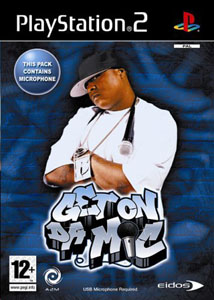| Get On Da Mic | |
|---|---|
 | |
| Developer(s) | Artificial Mind and Movement / Highway 1 Productions |
| Publisher(s) | Eidos Interactive |
| Platform(s) | PlayStation 2 |
| Release | |
| Genre(s) | Music |
| Mode(s) | Single-player, multiplayer |
Get On Da Mic is a video game for the PlayStation 2 published by Eidos and co-developed by Canadian studio A2M and Highway 1 Productions. It focuses on hip hop songs.
Contents
The game is based on karaoke singing in which a singer sings a popular song while it plays with the vocals. The games are able to detect the pitch of the singer's voice and award points based on how well the singer matches the pitches they are supposed to be singing.
Get On Da Mic requires the use of the same kinds of microphones also used with the Karaoke Revolution games. A hand-held karaoke microphone made by Logitech is available in a bundle with the game and is also sold separately; Logitech also sells a microphone headset.